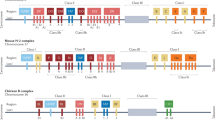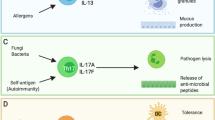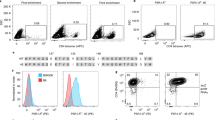Abstract
To trigger class II-restricted T cells, antigen presenting cells have to capture antigens, process them and display their fragments in association with class II molecules. In most species, activated T cells express class II molecules; however, no evidence has been found that these cells can present soluble antigens. This failure may be due to the inefficient capture, processing or display of antigens in a stimulatory form by T-cells. The capture of a soluble antigen, which is achieved by nonspecific mechanisms in macrophages and dendritic cells, can be up to 103 times more efficient in the presence of surface receptors, such as surface immunoglobulin on B cells that specifically bind antigen with high affinity1,2. We asked whether T cells would be able to present soluble antigens that bind to their own surface molecules. Here we show that such antigens can be effectively processed and presented by both CD4+- and CD8+-bearing human T cells. This indicates that T cells are fully capable of processing and displaying antigens and are mainly limited in antigen presentation by their inefficiency at antigen capture.
This is a preview of subscription content, access via your institution
Access options
Subscribe to this journal
Receive 51 print issues and online access
$199.00 per year
only $3.90 per issue
Buy this article
- Purchase on Springer Link
- Instant access to full article PDF
Prices may be subject to local taxes which are calculated during checkout
Similar content being viewed by others
References
Rock, K. L., Benacerraf, B. & Abbas, A. K. J. exp. Med. 160, 1102–1113 (1984).
Lanzavecchia, A. Nature 314, 537–539 (1985).
Lanzavecchia, A. et al. J. exp. Med. 167, 345–352 (1988).
Laski, L. A. et al. Cell 50, 975–985 (1987).
Klatzmann, D. et al. Nature 312, 767–768 (1984).
Sattentau, Q. J., Dalgleish, A. G., Weiss, R. A. & Beverly, P. C. L. Science 234, 1120–1123 (1986).
Gerrard, T. L., Volkman, D. J., Jurgensen, C. H. & Fauci, A. S. Hum. Immun. 17, 416–425 (1986).
Lamb, J. R. & Feldman, M. Nature 308, 72–74 (1984).
Rammensee, H. G., Bevan, M. J. & Fink, P. Immun. Today 6, 41–43 (1985).
Gelderbloom, H. R., Reupke, H. & Pauli, G. Lancet ii, 1016–1017 (1985).
Schneider, J., Kaaden, O., Copeland, T. D., Oroslan, S. & Hunsmann, G. J. gen. Virol. 67, 2533–2539 (1986).
Lasky, L. et al. Science 233, 209–212 (1986).
Roosnek, E., Demotz, S., Corradin, G. P. & Lanzavecchia, A. J. Immun. 140, 4079–4082 (1988).
Rabinovitch, P. S., June, C. H., Grossmann, A. & Ledbetter, J. A. J. Immun. 137, 952–961 (1986).
Author information
Authors and Affiliations
Rights and permissions
About this article
Cite this article
Lanzavecchia, A., Roosnek, E., Gregory, T. et al. T cells can present antigens such as HIV gp120 targeted to their own surface molecules. Nature 334, 530–532 (1988). https://doi.org/10.1038/334530a0
Received:
Accepted:
Published:
Issue Date:
DOI: https://doi.org/10.1038/334530a0
This article is cited by
-
Identification of a T cell gene expression clock obtained by exploiting a MZ twin design
Scientific Reports (2017)
-
Conventional CD4+ T cells present bacterial antigens to induce cytotoxic and memory CD8+ T cell responses
Nature Communications (2017)
-
γδ T-APCs: a novel tool for immunotherapy?
Cellular and Molecular Life Sciences (2011)
-
Lack of fair play in the T cell response
Nature Immunology (2002)
Comments
By submitting a comment you agree to abide by our Terms and Community Guidelines. If you find something abusive or that does not comply with our terms or guidelines please flag it as inappropriate.



